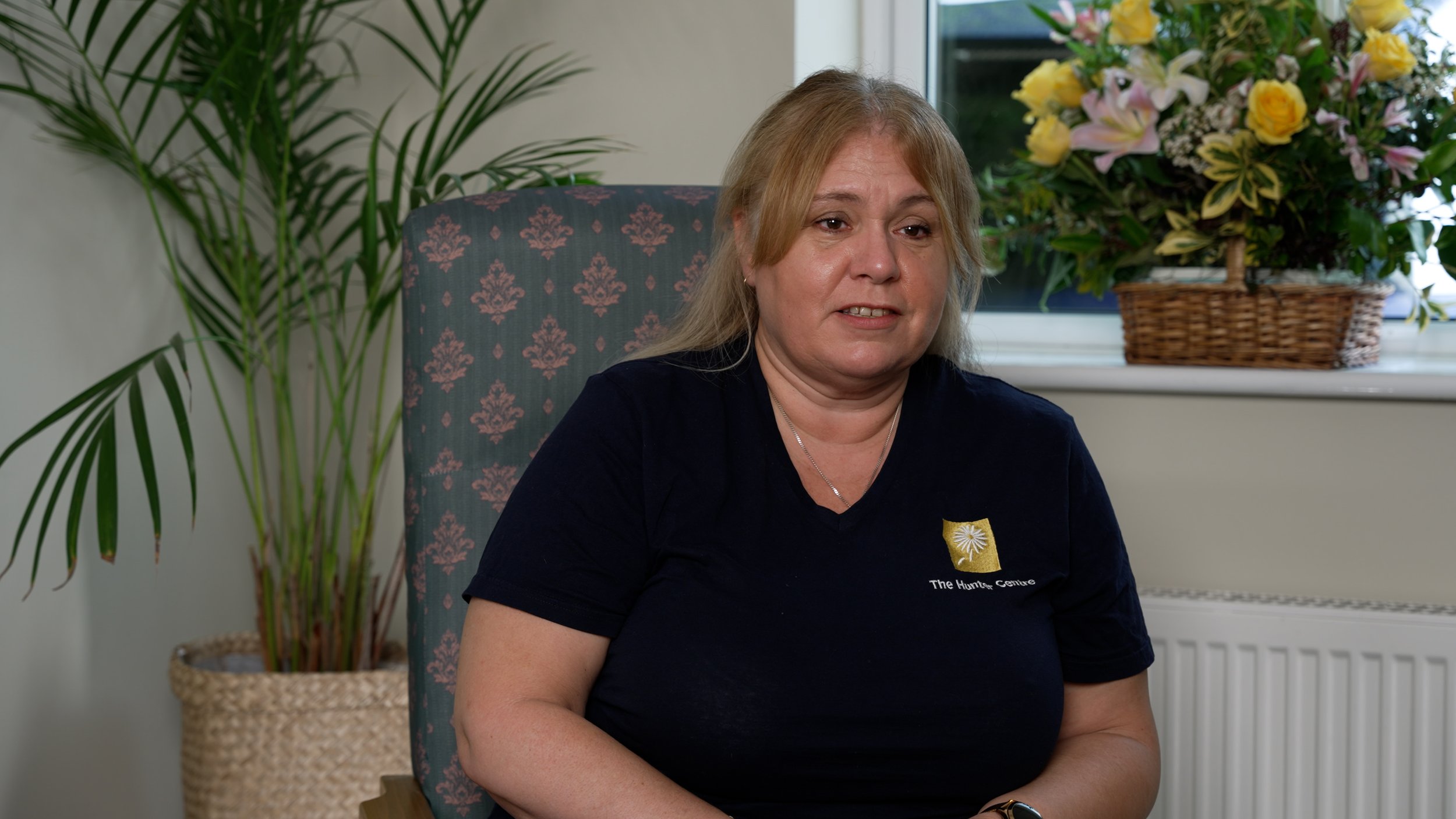
Information and advice
The Hunter Centre’s staff are well trained in dementia care, and are always happy to share knowledge and advice
Here are some of our most frequently discussed topics:
What is Dementia?
-
Dementia is a broad term used to describe different types of degenerative diseases of the brain. There are many different types of dementia, the most common being Alzheimer’s disease, Vascular Dementia, Dementia with Lewy Bodies and Parkinson’s dementia. Alzheimer’s disease accounts for 60 – 80% of dementia cases.
Dementia is a brain disorder that slowly destroys memory, thinking and reasoning skills and eventually the ability to carry out the simplest tasks. Symptoms can appear at any age, but most commonly in people in their mid 60s, and it can happen to anyone.
-
Dementia can be confused with other conditions with similar symptoms so it’s important to get a formal diagnosis to rule out other treatable diseases. This will clarify what is ‘wrong’; it will allow people to get the necessary information, advice and support they need; to access drug treatment and clinical trials, and most importantly it will give people the time to plan for the future.
To get a diagnosis go to your GP. Initially the GP will perform tests including blood and urine to rule out other ailments. Once these are ruled out the GP may refer the patient to a specialist consultant, who will involve the Community Mental Health team and possibly a Memory Clinic who will perform tests and give the dementia diagnosis. It is important to get it in writing as this will help with access to benefits.
Once an official diagnosis is made, the local Community Mental Health team may prescribe drugs which are aimed at slowing the progression of the disease. The team should provide you with details of benefits that may be available, Council Tax reduction and information about support services in your area, such as The Hunter Centre. We can help with more information and advice. The ‘useful links’ below also suggests some organisations that can provide advice and practical help.
In addition to assistance from the Mental Health team, a diagnosis can involve access to adult social services and occupational health teams as well as to a social prescriber. Social prescribing involves taking a holistic approach to health and wellbeing, focusing on what matters to you and can help connect you to community groups and statutory services for practical and emotional support.
-
Dementia symptoms can vary from person to person, and it is impossible to predict what impact it will have on each individual. Memory may become less reliable, but other symptoms may include:
• Becoming lost in familiar places
• Not recognising a familiar face
• Forgetting where you left something
• Repeating yourself
• Changes in vision
• Communication difficulties
• Change in cognitive skills, making everyday tasks a challenge
• Being unsteady on your feet
• Changes in your mood. -
The cognitive decline that accompanies dementia conditions does not happen all at once and the progression of dementia can be divided into seven distinct, identifiable stages known as the Global Deterioration Scale (GDS). Dementia starts silently with brain changes that begin years before anyone notices a problem. Hence the stages can be summarized as follows:
• Pre-dementia or early stage dementia where a person can live independently and may not exhibit obvious memory loss
• Moderate or mid-stage dementia where personality and behavioural changes become apparent, and assistance will be needed with daily activities
• Severe or late stage dementia involving severe cognitive impairment and loss of physical abilities, pronounced memory loss, inability to communicate or move without help.
Specific types of dementia progress at unique rates and differ from person to person.
The early stages can be confused with the normal ageing process such as forgetfulness, misplacing items, slow reactions, finding the right words and getting distracted.
-
The importance of continued social interaction and stimulation cannot be understated.
Thinking positively and involving family and friends, even though it can be difficult for all to come to terms with the diagnosis, will help to enlist their support and understanding. It may take time for people to feel comfortable and accept the condition and they may react differently initially because they don’t understand. In time they will accept and adjust.
Acceptance of the condition and peace of mind can help with mental well-being, and maintaining regular activities as well as pursuing interests and hobbies for as long as possible will reduce isolation and loss of contact with others. Meeting new people in the same situation can also be helpful.
Carers will need support and respite as the disease progresses and should be identified and registered with the GP. There will be help available within the community and these should be contacted, for example local community transport services, meals on wheels and church groups.
See our useful links section below for some suggested organizations that may be helpful.
-
Dementia is a progressive disease requiring monitoring at all stages, but studies show that key lifestyle changes are very important in reducing the risk of developing dementia and in slowing down the progress of the disease. Medical and research journals generally agree that the following factors are important in minimizing our risk of brain disease:
• Manage blood pressure
• Eat Healthily
• Reduce blood sugar
• Control cholesterol
• Lose weight
• Exercise regularly
• Keep your brain stimulated
• Get a regular good night’s sleep
• Relax your mind, avoid daily stress
• Socialisation
• Check your hearing
• Protect Your Head
• Stop smoking
• Reduce alcohol intakeIn essence keeping active and well is vital in the management of dementia. Not only is it necessary to exercise and eat a healthy diet, but also to ensure you have regular medical, dental, sight and hearing tests. You should also ensure that vaccinations are up to date.
-
A dementia diagnosis is not the end of the world. There are many things that someone living with dementia will continue to be able to do with friends and family, though these will change over time.
Garden centres, coffee shops and libraries are usually safe spaces and many are now dementia friendly.
Sharing memories can help with communication. This can give the persons with dementia a sense of self by acknowledging achievements in their lives. By keeping connected with those around them this can help with general mood and self-confidence. In general photographs, postcards and music are known to bring back memories and raise the spirits. Singing can improve brain activity, well-being and mood – you may be able to find a singing group near you.
Creating a memory box full of mementoes from hobbies, letters and things of sentimental value can be helpful in generating conversation and reminiscence, as can creating a life story book. Jigsaws and puzzles can be useful as stimulation and watching old movies can be fun for all.
-
Someone with dementia can still communicate effectively but there are a number of things you can consider to facilitate this:-
• Put time aside to talk to the person with dementia
• Don’t have too many visitors at once
• Remove distractions, turn down loud television or radios and move to a quiet place
• Speak at a slower pace, clearly and calmly
• Ask short questions that might have a ‘yes or no’ answer
• Don’t tell them about too much into the future, just explain what is happening now
• When approaching them, say their name clearly, so that they are aware you are addressing them and smile
• If you are offering them a choice e.g. what to eat, offer them a choice of two but no more than three things and be clear about what you are asking them
• Try not to use too many open-ended questions
• If they use a hearing aid check the battery is working!
• Think about your body language
• Use visual aids – the written word, pictures, or objects
• When chatting with someone with dementia, don’t correct them if their memories are incorrect, go into their reality, try not to bring them into yours.
Routine is important so try and keep meal times at the same time and in the same place each day.
Complementary Approaches
-
As with any illness, there are certain foods which can help slow dementia symptoms. A diet rich in these can benefit brain function. Ensure you are getting lots of green, leafy vegetables (they contain vitamin K and brain boosting antioxidants), low fat dairy, poultry, blueberries and cruciferous vegetables such as broccoli, sprouts and cauliflower.
People with dementia are more likely to suffer from dehydration as they do not realise that they are thirsty and this can make symptoms, including confusion, worse. Like everyone, they should be encouraged to keep up their liquid intake.
-
Keeping fit is essential to physical and mental wellbeing
-
Research has shown that lavender oil or lemon Melissa balm on the pillow or in a diffuser has helped people with dementia to feel calmer. They can help promote longer and more restful sleep with fewer wake ups and reduce agitation in sleep like wandering.
-
Music is a very evocative medium and flows through our lives from childhood to old age. Therefore, with a dementia diagnosis, music can be used to enhance how we communicate, and to stimulate wellbeing in those experiencing symptoms. Whether structured or unstructured, musical therapy is different between individuals, but can help to encourage physical movement, lessen distress, and prompt memory recall.
Financial & Legal
-
It is vital to plan for future care needs.
Putting your affairs in order should include thinking about finances and how to manage money going forward. Plans should include budgeting for any extra help which may become increasingly necessary, including the possibility of having to go into care.
Benefits: everyone needing care is entitled to Attendance Allowance so you should investigate this with your local authority. However this may not cover all the help which will increasingly be needed.
Help may also be available from the local authority although some benefits are means tested. Assessments will be required to determine eligibility. Useful information can be found here:
www.alzheimers.org.uk/get-support/legal-financial/benefits-dementia
-
Symptoms of dementia become worse over time and so plans for the future are important. These include ensuring your wishes are upheld once ‘mental capacity’ is impaired. Protection is provided by the ‘Mental Capacity Act’ which allows people to express their preferences for care and treatment, and to appoint a trusted person to make a decision on their behalf should they lack capacity in the future.
To cater for when you cannot make a decision on your own, ensure that living wills and powers of attorney are in place. Check that wills and living wills are up to date and that lasting power of attorney (LPA) documents have been completed for both health and welfare, and property and finances. These both then need to be registered with the Office of the Public Guardian. Assistance on these can be given by local solicitors.
Respite & Care Options
-
As the disease progresses those caring for someone with dementia may need to be supported themselves. Respite allows a carer a break and generally involves options such as a day care centre, help in the home or residential care for the person with dementia.
-
Many people are well able to remain living in their own homes with support from Day Centres such as The Hunter Centre. Here, at The Hunter Centre, professional care and stimulation can be provided for those diagnosed with dementia while the carer benefits from a day to themselves.
The Operations Manager will be happy to discuss what The Hunter Centre can offer or what may be available in your area. You can reach her on 01428 654710 or 07482 464322.
-
There are many types of homecare. The first point of contact should be local social services to provide an assessment of care and needs. Needs can range from short sessions for things like help with personal care, cooking or domestic activities, to full day care, or to live-in care. Live-in care is becoming increasingly popular as it provides independence in the home.
Much information on help in the home can be found on your local authority website. If you are not eligible for free in-home care, these services can be procured privately from independent Homecare agencies who will be regulated by the Care Quality Commission. Your budget should include an allowance for this.
-
Some care homes have specialist dementia units.
Families and those looking after someone with dementia should not feel guilty about having to ask a care home to look after a loved one. With the practicalities of care and personal care taken on by trained professionals you will be able to spend more quality time together.
-
Choosing the most suitable home for your loved one is an important and difficult decision. Here are a few things for you to consider, though nothing beats visiting a home in person.
1. Look at online reviews. They are becoming increasingly influential in our decision making
2. Every Residential, Care or Nursing home is inspected by the Care Quality Commission (CQC) - the independent regulator of health and social care in the UK. These reports are readily available online and should be easy to find on a home’s website.
3. Explore the home’s social media. Active social media pages provide an insight into life in the home and can be the quickest way to get a feel for its approach
Does the home run regular activities/outings?
Do the residents look happy and healthy?
Do the staff celebrate special occasions?
4. What involvement and relationship do families and carers have with the home?
5. Is the home focused on individuals and their needs or do they ask for compliance to their routine?
6. How dependent is the home on agency staff? It is better if they use permanent / employed staff who know the residents and their care needs.
Useful Links
It can be hard to know where to start when looking for information about dementia or sources of local help. We have found that the following sites are a useful point of reference.
General help for the elderly
-
Tel: 0300 200 1005
Email: asc.infoandadvice@surreycc.gov.uk
Website: https://www.surreycc.gov.uk/adults
-
Tel: 01243 642555
Email: socialcare@westsussex.gov.uk
Website: www.westsussex.gov.uk/social-care-and-health/social-care-support
-
Tel: 0300 5551378
Website: www.hants.gov.uk/socialcareandhealth/adultsocialcare
-
Website: www.citizensadvice.org.uk/
-
-
Tel: 01483 503414
Website: www.ageuk.org.uk/surrey/
-
Tel: 01962 868545
-
Tel: 01903 731800
-
Supports patients with all diagnoses, and not just patients with cancer
Website: www.sussexcommunity.nhs.uk/services/midhurst-macmillan-specialist-palliative-care-service/109001
Dementia advice
-
Tel: 0333 150 3456
-
Website: www.dementiauk.org
-
-
Tel: 01483 528100
-
-
Website: https://www.adaptdementia.com/
Community Transport
-
-
Tel: 01428 723972 (10am-1pm)
Website: https://www.careinhaslemere.org.uk/
-
(Mon-Fri 9-5)
Tel: 07498 068224
-
Tel: 01428 717389
-
liphook.voluntary.care@gmail.com
Tel: 01428 723972
-
-
-


